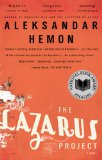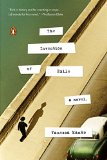Summary | Excerpt | Reviews | Beyond the book | Read-Alikes | Genres & Themes | Author Bio

In 1908, 19-year-old Lazarus went to the home of George Shippy, the Chicago chief of police to deliver a letter - but Shippy shot Lazarus twice, killing him. Now, in the 21st century, a young writer, Brik, becomes obsessed with Lazarus' story - what really happened and why? As digs deeper, the stories of Lazarus and Brik become inextricably entwined.
Aleksandar Hemon has earned a reputation as one of the English language's most original and moving wordsmiths. In The Lazarus Project, Hemon turns these talents to a novel that intertwines haunting historical atmosphere with sharp—sometimes hilarious, sometimes heartbreaking—storytelling.
On March 2, 1908, 19-year-old Lazarus Averbuch, a Jewish immigrant from Eastern Europe to Chicago, knocked on the front door of the home of George Shippy, the Chicago chief of police. When Shippy came to the door, Lazarus offered him what he said was an important letter for him. Instead of taking the letter, Shippy shot Lazarus twice, killing him. Shippy released a statement casting Lazarus as a would-be anarchist assassin and agent of foreign political operatives, leaving Lazarus's sister, Olga, bereaved and stranded at the center of a city and a country simmering with ethnic and political tensions.
Now, in the 21st century, a young writer in Chicago, Brik, also from Eastern Europe, becomes obsessed with Lazarus' story—what really happened, and why? In order to understand Lazarus Averbuch, Brik and his friend Rora—who overflows with stories of his life as a Sarajevo war photographer—retrace Lazarus's path backwards across Eastern Europe, through a history of pogroms and poverty, and through a present-day of cheap mafiosi and cheaper prostitutes. The stories of Lazarus and Brik become inextricably entwined, augmented by the photographs that Rora takes on their journey, creating a truly original, provocative, and entertaining novel that will confirm Hemon once and for all as one of the most dynamic and essential literary voices of our time.
It is simple to predict the fate of The Lazarus Project: it will deservedly turn up on many "best of 2008" lists. Its characters have lingered in my mind, but what sets the novel apart is the language that Hemon has imagined into being for describing the reality just to the side of the one in plain view. To dive into a Hemon novel is to feel, at least for the duration of its pages, that we are all exiles from the country of the real...continued
Full Review
 (1001 words)
(1001 words)
(Reviewed by Amy Reading).
Aleksandar Hemon's extraordinary life story is more than simply fodder for
book publicists. It informs everything he has written, for his work is
restlessly autobiographical, infused with the urgency of thinking through his
life on paper.
In 1992, Hemon was a young Bosnian writer, just two years out of the
University of Sarajevo and about to publish his first book, a collection of
spare and modernist short stories. Then Sarajevo was surrounded by the Yugoslav
National Army and the Bosnian War broke out. Hemon's book was never published.
As he said later, "Stopping that was the best thing the war ever did."
Hemon was on a one-month tour of the United States when his city was
besieged, and the visit turned him into an ...

If you liked The Lazarus Project, try these:

by Vanessa Manko
Published 2015
Through the unforgettable character of Austin Voronkov, Manko explores the little-known period in American history of the Palmer Raids and the far-reaching implications of exile and loss.

by Boris Fishman
Published 2015
A singularly talented writer makes his literary debut with this provocative, soulful, and sometimes hilarious story of a failed journalist asked to do the unthinkable: Forge Holocaust-restitution claims for old Russian Jews in Brooklyn, New York.